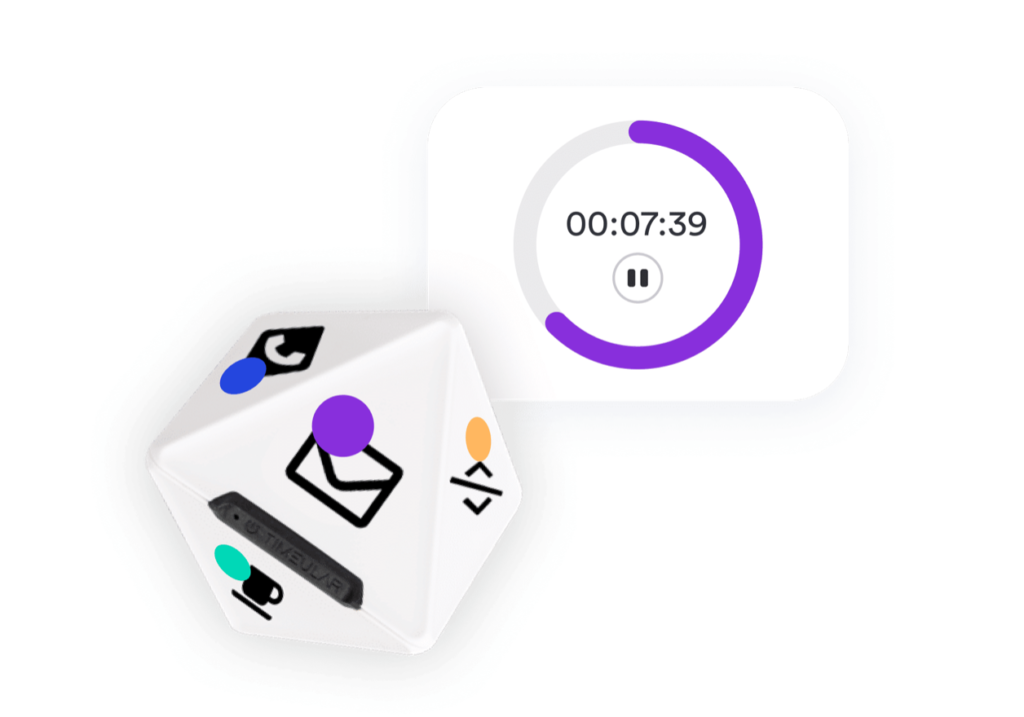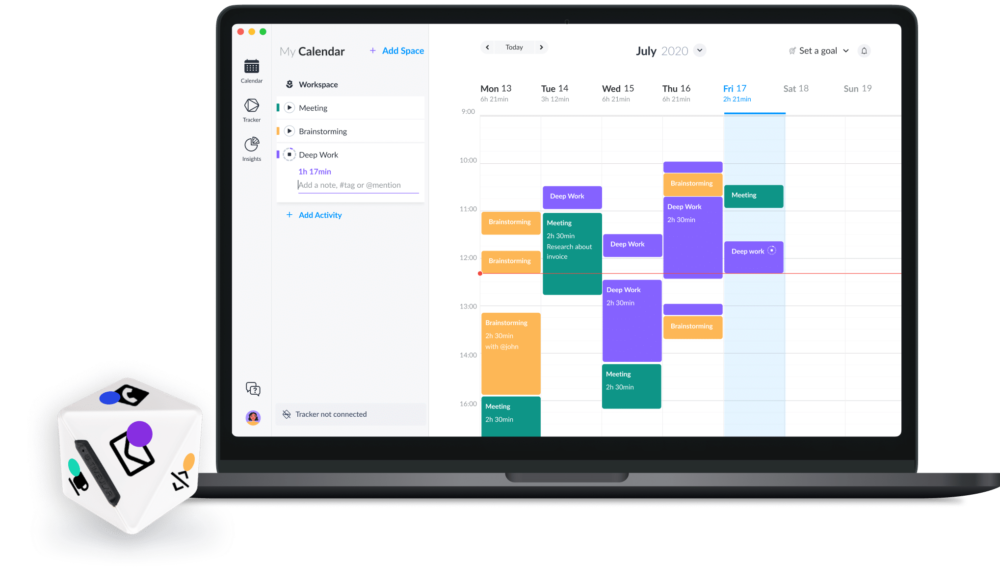Let’s start with one reason we’re providing this Timeular review, to help you think about the best way to record how you spend your time as a freelancer.
I recently had a conversation with a client about accounting for hours. He needed an estimate of what percentage of my time had been spent on a variety of projects so that he could bill his clients in a way that made sense. Since he is also a contractor, we have similar roles and challenges when it comes to managing schedules and finances.
To my shock, and yes, horror (I confess, I was judging just a little bit), he had no formal way of tracking his hours.
I get it—there are a variety of ways to bill clients, and hourly is not always best. However, even if you charge per project or collect a monthly retainer, I’m going to make a bold statement that I think applies to everyone. If you are freelancing and not tracking all of your time, you’re doing it wrong. T
There are clients who will insist on a careful accounting of all your hours, but tracking your time is not just about the people you work with. Logging hours will give you incredible insights into what your time is worth.
Seeing hours you spend on billable projects vs marketing vs administrative tasks will let you know if you are working efficiently. It will give you a snapshot of where you can save yourself time and energy. What tasks should be outsourced? Which projects are you coming out ahead on? Which clients are you not billing enough?
And, when a client calls, needing to justify costs to their manager or budget for the next quarter, being able to pull up reports at the click of a button will save you a world of pain.
Now that I’ve convinced you (and, don’t worry, my client as well) of the need to reliably track your hours, let’s dive into the Timeular review.

What is Timeular? Pros, Cons & Pricing
There are many time-tracking solutions for freelancers, but Timeular is a little bit different. Most time trackers are a digital solution, but Timeular is a physical object anchored to digital software. The object is essentially an 8-sided die, the Zie, and when you flip it over, it tracks your next task.
You choose what each side represents, by drawing your own illustrations, adding labels, stickers, color-coding, or anything else that makes sense for your business.
We’re coming at this Timeular review after it has been on the market for five years, so tens of thousands of people have used it, proven the concept, and provided their own assessments.

With that in mind, here are some of the pros of Timeular that stand out:
- Easy to use: Nearly every user of Timeular says the same thing—the software is incredibly intuitive. It is easy to program each side, easy to add, delete, or modify time as needed. You can unbox the die, download the software and start tracking your hours right away.
- Fun: There’s just something cool about this little device. Flipping the die from side to side is almost like a game, and gives you a sense of accomplishment and satisfaction. The device on your desk is also a great conversation starter.
- Email reports: With the pro version, weekly reports are sent straight to your inbox to help you visualize your work week and make changes to your habits accordingly. The reports show your total hours, daily average, how many different tasks you worked on, the number of time entries logged, and comparisons to the previous week.
- Versatility: Each Timeular review by users includes various ways that they use the device, the software, or a combination of the two to track hours and improve productivity. You choose how to label each side, and you can include additional notes, use hashtag labels or coded tags to further break down your tasks and organize your processes.
Like most tools for freelancers, the Timeular product has some drawbacks, depending on how you plan to use it. Here are some of the cons you may want to consider before purchasing:
- Integration: While Timeular has so many potential uses, its integration with other software could be better. There is no way to create invoices directly in the Timeular interface, and no easy way to export data to a third party solution. If you are looking for a simple time-tracker, it’s hard to beat Timeular, but if you’re looking for an all-in-one solution, this may not be the one for you.
- Connectivity: Some users have occasional issues with the Timeular device connecting with their computer or phone, or disconnecting at the end of the day. The problem is easily solved with a reboot, but the physical object and Bluetooth connection undoubtedly add a layer of complication that a simple time-tracking app does not have.
- Multi-tasking: If you often work on multiple projects at once, I have bad news for you in this Timeular review. Since the device tracks time based on which side is facing up, it is impossible to track two separate tasks at once. You can use multiple devices with multiple team members, but each device can only be synced with one machine at a time.
No Timeular review would be complete without an assessment of the pricing. Timeular can be as inexpensive as $79 or as much as $249, depending on the plan you choose. The device on its own comes in at $89. If you use the free version of the software, that’s all you have to pay.
To upgrade to the pro version, you pay just $7 per month (paid annually). And of course, you have the option to use the software without the physical device at all, making it completely free!
How to Use Timeular
At first glance, the Timeular device seems a bit foreign and tricky to use, but in reality, the process is fairly simple.
For the purposes of this TImeular review, let’s break things down into three phases: setup, tracking and reports.
1. Setup
To get started with your Timeular device, you need to download and install the software, which is as easy as clicking a link. You can create your account with your Timeular order, or during the software setup.
Once you get the software installed, you’ll pair your time tracker with your computer. From there, it is pretty easy to assign activities to each side of the Zie device—just flip each side up and choose a color and a label for it.

At the same time, you can apply stickers, write or draw on each side so that you know which side is which. Time tracking starts immediately once an activity is assigned.
There are helpful tutorials right on the Timeular website to help you get started if you’re stuck.
2. Tracking
Tracking with the Timeular device is effortless. When you are ready to work on a task, simply lift the Zie out of the base and set it with the side representing your task or project facing up. Time starts tracking right away.
If you accidentally leave the Zie on one side after you have moved on to something else, forget to start tracking or forget to stop, you can edit your time either in the app or within the software on your desktop.
Simply click on the “Calendar” in the navigation bar, and from there you can make all of the changes you need.
3. Reports
In the pro version of the Timeular software, reports are automatically generated and sent to your email each week. Even if you don’t upgrade to pro, you can pull data from Timeular to evaluate your productivity or submit timesheets.
There is a handy insights tab that includes a breakdown of your tracked hours. You can filter it by date, include only certain tasks, clients or projects, and include custom tag labels or hashtags.

If you don’t pay for the pro version, unfortunately, you cannot export this data into a usable format (CSV, Excel, or PDF). If you need to submit formal reports to clients, it is probably worth the $7 monthly fee.
3 Benefits of using Timeular
From the point of view of this Timeular review, there’s no doubt that this is a great time-tracking product. Here are just some of the advantages of using Timeular software and the Zie device offers:
1. Increased productivity
Think of time tracking as budgeting finances. Accounting for your hours is every bit as important as accounting for your dollars. As a freelancer, your time represents billable income. Managing it wisely will help unlock your earning potential.
2. Creating strong habits
For some people, tracking hours is a difficult habit to start. This is particularly true if you have been freelancing for a while without using a reliable time-tracker.
The Zie device is a powerful physical reminder that you need to start tracking time. It is also helpful in transitioning tasks. The act of flipping the die helps you reset your brain and adjust to the new project.
3. Confidence
As you start to see your hours in a graphical form, you will start to make better choices. You can also back up every single minute you spend when you come across those difficult clients who want you to justify your rates. All of this will help you gain confidence in your value as a freelancer.
Timeular alternatives
This is a Timeular review, but there are lots of other time management solutions for freelancers. FreshBooks, Bonsai, Paymo, Toggl and Harpoon are just a few of them.
If you want a more encompassing project-management solution, check out our handy list here.
Conclusion
I don’t want to be dramatic, but keeping track of how you spend your time will literally change the way you do business as a freelancer.
If you have trouble with traditional time trackers, the physical nature of Timeular might be the key to getting you started with positive time management habits.
The easy setup, the versatility of use and useful reporting will all lead to more efficiency in your day, better habits and a positive feeling of control over your business and your life.
Besides—it is just plain fun.
Keep the conversation going...
Over 10,000 of us are having daily conversations over in our free Facebook group and we'd love to see you there. Join us!


